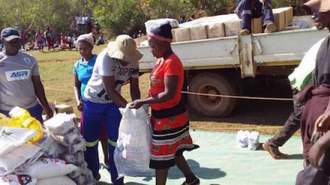Millions face starvation in Zimbabwe and Zambia

Cooking oil, maize meal, salt, rice and beans being distributed in Mutare, Zimbabwe.
Source: CAFOD
Hunger on a massive scale is looming across Zimbabwe and Zambia. Families will not have enough food to eat in the coming months because of a crippling drought, CAFOD reports.
In August 2019, the United Nations warned that Zimbabwe faced a major food crisis which affected a third of its population - more than five million people. Today, that figure has increased to more than 7.7 million people, more than half the population of 14 million.
In Zambia the devastating effects of an extreme dry spell has withered crops, leaving more than 1.7 million people struggling to feed themselves.
Local Church emergency response experts are already in communities, identifying families in the greatest need.
Verity Johnson, CAFOD's Country Representative for Zimbabwe, based in Harare, said: "Years of economic turmoil and climate change, as well as the recent Cyclone Idai, are pushing families to the brink of starvation. Last year's harvests failed, largely due to extreme weather, from droughts that lasted for months on end, to flooding which wiped out whole villages.
"The cost of food has risen exponentially, and there are severe bread shortages across the country. Where it can be found, a loaf of bread in Zimbabwe now costs up to fifteen times more than it did a year ago. In the struggle to feed their children, parents are going without themselves.
"The prolonged drought means dams have failed to fill. Wells and rivers are drying up, leaving communities with no option but to walk tens of kilometres to reach water."
CAFOD has already given £50,000 to the emergency response. Local aid experts are carrying out rapid assessments in the worst-affected communities. Through the Church network, CAFOD has intensified efforts over the last few weeks to provide families in need with emergency food and safe, clean water.
Catholic Church leaders and other Christian denominations met on 7 October to discuss the deteriorating situation. In a pastoral letter they called for urgent action to tackle the crisis, saying:
"We are currently faced with a national humanitarian and emergency situation, we as the church commit ourselves to up scaling our efforts towards health, education, development and humanitarian assistance. In the same vein, we call on all political actors, state and non-state actors to respond to the immediate needs for humanitarian assistance and social services to alleviate the suffering of Zimbabweans."
In Zambia, there has also been erratic rains and extreme dry spells, which has left the country facing its worst drought and food shortage in a decade. Maize, rice and wheat crops have failed and today, 1.7 million people are in urgent need of food and clean, safe water.
CAFOD's country representative, Mwila Mulumbi, said: "People have run out of ways to cope, and are forced to survive on wild fruits and leaves. In some cases this causes diarrhoea for vulnerable under fives and the elderly.
"Low water levels in major rivers, and increased extraction of groundwater, mean that people will not only have less clean water to drink, but face losing their livestock, a situation compounded by an outbreak of foot-and-mouth disease."
The drought has hit hardest in southern, western and parts of Lusaka, eastern and central provinces. The Zambia Catholic Bishops' Conference say already more than 400,000 households are facing worsening food and water shortages.
Bishop Evans Chinyemba of Mongu, expressed his grave concern saying: "If nothing is urgently done, we may begin to experience deaths from hunger."
The UN's World Food Programme (WFP), expects that the 1.7 million people affected by hunger will rise to 2.3 million during the 'lean season' - from October into March 2020.
Even if rains do come, it may not be the blessing it first seems. The land is so dry that heavy downpours can often just run straight off the land, causing flash floods and soil erosion.
Farmers able to plant can put their seeds in the ground, but the harvest will be several months away, leaving a long 'hunger gap'.
Earlier this year cyclones hit Mozambique, Zimbabwe and other southern African countries, causing widespread destruction of crops. Many of the farming communities affected grow crops to feed their families and sell the surplus at local markets. These farmers are still struggling to recover from the destruction of the cyclones.
"Villagers allow their cattle to graze on the riverbanks of the receding Lake Kariba in Zimbabwe. Families and their livestock will not have enough food to eat in the coming months because of a crippling drought in the country."
In Pope Francis's Encyclical - Laudato Si', he speaks openly about the devastating effects of climate change on people and the planet. He says that climate change is real, urgent and must be tackled. He also describes the climate as "a common good, belonging to all and meant for all."
To support CAFOD's work in Zimbabwe and Zambia see:
https://cafod.org.uk/donations/one-off?_Amount=25&_Appeal=122068


















